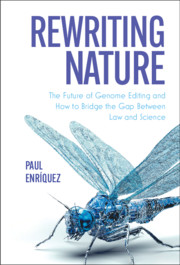Book contents
- Rewriting Nature
- Rewriting Nature
- Copyright page
- Dedication
- Summary of Contents
- Contents
- Figures
- Foreword
- Acknowledgments
- Table of Cases
- Abbreviations
- 1 A Momentous Time for Humankind
- 2 How an Idea Became a Reality
- 3 What Is Genome Editing?
- 4 Molecular Paraphernalia
- 5 What Can Genome Editing Be Used for?
- 6 Redesigning Food
- 7 Regulating Bioengineered Food
- 8 Redesigning Humanity
- 9 DNA and the Administrative State
- 10 Constitutional Predicaments
- 11 Science, Law, and Policy
- 12 Epilogue
- Index
3 - What Is Genome Editing?
Published online by Cambridge University Press: 11 June 2021
- Rewriting Nature
- Rewriting Nature
- Copyright page
- Dedication
- Summary of Contents
- Contents
- Figures
- Foreword
- Acknowledgments
- Table of Cases
- Abbreviations
- 1 A Momentous Time for Humankind
- 2 How an Idea Became a Reality
- 3 What Is Genome Editing?
- 4 Molecular Paraphernalia
- 5 What Can Genome Editing Be Used for?
- 6 Redesigning Food
- 7 Regulating Bioengineered Food
- 8 Redesigning Humanity
- 9 DNA and the Administrative State
- 10 Constitutional Predicaments
- 11 Science, Law, and Policy
- 12 Epilogue
- Index
Summary
Socrates, the renowned philosopher, famously averred that “the beginning of wisdom is the definition of terms.” The veracity of that ageless quip is, of course, debatable from a rhetorical standpoint. The definition of terms may or may not mark the genesis of wisdom but, rest assured, conceptual reflection of term definitions indisputably constitutes a crucial early step in legal construction and interpretation. This chapter focuses on a simple, yet fundamental, question that remains unaddressed in modern literature: What exactly is genome editing? To that end, the chapter lays an interpretive and normative foundation that imports meaning into the term’s scope. It starts by highlighting how scientific literature has remarkably devoted substantial efforts to discuss ways to develop, use, improve, and expand the technology without actually attaching a particular meaning to the term. After exposing limitations associated with the use of dictionaries in legal analysis, the chapter argues that congruity and uniformity on genome-editing terminology is sorely needed now due to the increasing interdisciplinary reach of the technology. Accordingly, it advocates for the adoption of a unified definition of genome editing. The proposed definition undergoes rigorous analysis and, along the way, the chapter dispels the myth that law generally lags behind scientific progress.
Keywords
- Type
- Chapter
- Information
- Rewriting NatureThe Future of Genome Editing and How to Bridge the Gap Between Law and Science, pp. 69 - 110Publisher: Cambridge University PressPrint publication year: 2021



